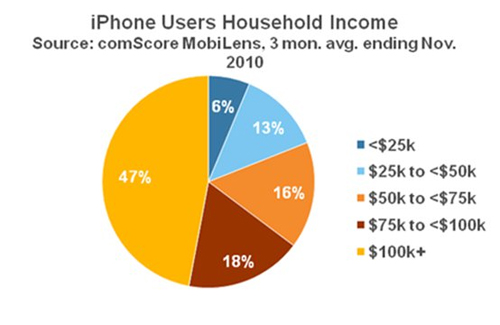分析称手机与社交游戏差异较大,但无碍两者融合趋势
社交游戏在移动领域的未来发展方向是业内最关心的话题之一,从2010年底开始,我们就已经可以看出手机与社交游戏这两者不断融合的趋势,越来越多社交游戏如今都纷纷移植到手机平台。最近,有一名行业博客主Leon Kitain发表了他对手机及社交游戏平台这两者的看法。
用户结构/游戏题材
手机游戏与社交游戏锁定的用户极为不同,从Facebook和iPhone游戏玩家的收入对比中就可以看出这一点(详见下图):
iPhone用户总体上更为富裕(47%用户的家庭收入在10万美元以上),而Facebook用户却更集中于中低阶层。正是由于用户平均收入更高,iPhone社交游戏就可以尝试更有趣的题材,因为高收入的用户不介意花钱尝鲜。而Facebook游戏则侧重于农场、美食和购物等大众题材,不过也有一些以虚幻甚至是科幻题材的社交游戏,在iPhone平台上相对更为成功。
游戏时长/访问频率
传统社交游戏的用户回访率比手机游戏更高,而且用户在游戏中逗留的时间也更长久。在Facebook平台,大部分社交游戏玩家(95%)每周都会花大量时间玩游戏,将近三分之二的用户(64%)每天至少玩一次游戏;而在手机平台,玩家体验游戏的时间长度和频率则与此截然不同(如下图所示)。
由此可以看出,手机社交游戏应考虑用户体验时间更短暂、每日回访率更低的特点进行设计。除此之外,Facebook游戏中的任务机制在手机平台上也很难奏效,因为手机用户不太可能执行这些任务。实际上只有那些可提供短暂而即时性娱乐体验的社交机制,才更适合移植到手机平台。
营收模式
手机游戏与社交游戏之间的运营方式也略为不同。在Facebook游戏领域,最为盛行就是虚拟商品交易这种运营模式,而且提供了效果更好的无障碍支付方式,因此很容易被游戏玩家所接纳。而在手机平台上,虚拟商品交易模式并不普遍,广告赞助和付费下载模式反而更为可行,而这种营收模式却并不适用于社交游戏。
结论
虽然这两者存在不少差异,但总体上来看,它们的融合只是一个时间早晚的问题,虽然Android手机平台并不利于吸引出手阔绰的玩家,但新兴手机平台及iPad等设备的问世,却有助于提高玩家对游戏的回访率和访问量。除此之外,苹果也在不遗余力地推广和优化虚拟商品交易模式,同时也通过限制奖励下载模式等政策,为开发商创造更良好和公平的运营环境,所以手机社交游戏还有大量可挖掘的潜力。(本文为游戏邦/gamerboom.com编译,转载请注明来源:游戏邦)
Mobile Social Games – An Outlook
One of the questions that commonly comes up when discussing the future of social gaming is the role that mobile will play in the evolution of the genre. The big trend, starting at the end of 2010, and continuing in 2011 is that of the convergence of social and mobile, with more traditional social games trying to expand their presence into mobile. We’ve asked guest blogger Leon Kitain who works on both mobile and social games to talk a little bit about the difference between the two platforms:
Audience/Theme
Mobile games tend to target a different demographic than social games. Just look at the income comparisons between Facebook and iPhone games below.
While iPhone users are generally quite affluent (47% 100k+), Facebook users tend to be primarily lower/middle class. Because of the difference in demographics, iPhone social games can actually explore more interesting themes, as people with higher incomes tend to be more accepting of experimentation. So while Facebook games mostly focus on Farming, Food and Shopping, there are actually successful social games on the iPhone that have Fantasy and even Science Fiction themes and have seen relative success.
Session Length/Frequency of Play
Traditional social games have more frequent engagement than mobile games and often longer playing times. For Facebook, The vast majority (95%) of social gamers play multiple times per week; nearly two-thirds (64%) play at least once a day. For mobile, as you can see from the chart below, the frequency of play and the duration of play is wildly different.
Because of this, the design of mobile social games has to focus on shorter session lengths and less daily engagement. The same sort of appointment mechanics that dominate Facebook games work poorly on mobile because users aren’t as likely to keep those appointments. In fact, the social mechanics that are most becoming to mobile games are ones that provide instant, session based satisfaction.
Monetization
The monetization vectors for mobile games vs. social games are a bit different at the moment. Within the social game umbrella, the prevalent paradigm is that the best way to monetize users is through virtual goods. Virtual goods have become accepted by users, and Facebook, as a platform, tries to do their best to make the purchase of these goods as seamless as possible. On the other hand, in mobile games, virtual goods have not yet become as ubiquitous. In fact, on the platform, both advertising supported games, as well as paid games are completely viable, something that has not really worked for social games.
Conclusion
Still, in the end, I think that we’ll begin to see social games and mobile games converge in each of these spaces. Android is driving the affluence of mobile gamers down, while the merging of mobile and regular devices (such as the iPad) is going to drive up frequency of use and number of sessions. In addition, I have no doubt that Apple will do their very best to push and optimize the virtual goods model, making that monetization path more appealing to developers, while at the same time, clamping down on the value of CPI models as seen with their recent campaign against the offerwalls.(source: socialgamesobserver)










































 闽公网安备35020302001549号
闽公网安备35020302001549号